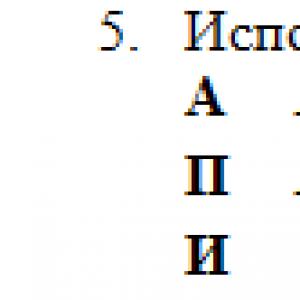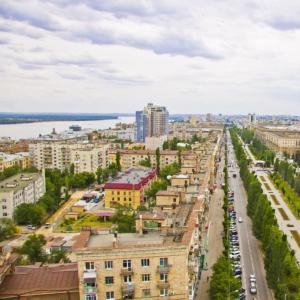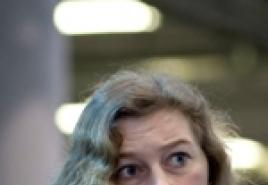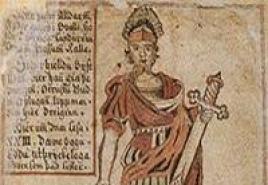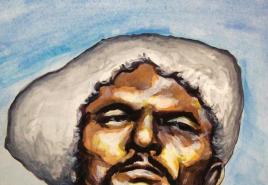Alexei Maslov, Commander-in-Chief of the Ground Forces, Colonel General: “Ground groups are the only way to control the territory.” Alexey Fedorovich Maslov: biography From space reconnaissance to equipment
Internal troops. History in the faces of Shtutman Samuil Markovich
MASLOV Pavel Tikhonovich (b. 10.10.1946)
MASLOV Pavel Tikhonovich
(b. 10.10.1946)
Deputy Minister of Internal Affairs of the Russian Federation - Commander-in-Chief of the Internal Troops of the Ministry of Internal Affairs (05/09/1998–04/05/1999)
Colonel (05/31/1986)
Major General (05/06/1989)
Lieutenant General (1995)
Colonel General (06/12/1998)
Born in the town of Shakhty, Rostov region, into a working-class family. Father and mother are from hereditary Don Cossacks. My paternal grandfather served in his youth in the “col1_1 convoy”. Graduated from 11th grade high school in 1964. Starting in August of the following year, he completed a three-year course of study under the program tank school at the Ulyanovsk Guards Higher Tank Command School named after V.I. Lenin, graduating with honors. Having received an appointment to the Group Soviet troops in Germany, served as a tank platoon commander, then a company commander in guards tank regiments (September 1968 - December 1973). Then he is transferred to the Leningrad Military District, where he continues his military service in the guards tank regiments as a company commander, battalion chief of staff, and battalion commander (December 1973 - August 1977). Entered the faculty as a student distance learning Military Academy of Armored Forces, which he graduated in October 1979. At this time he commanded a tank regiment. In October 1984 - July 1989 - deputy commander, commander motorized rifle division. In 1989–1991 - student of the General Staff Academy.
General P. T. Maslov's service in the internal troops begins. 07/02/1991 - 01/18/1993 - Deputy Head of the Directorate of Internal Troops of the USSR Ministry of Internal Affairs for Western Siberia. January 1993 - 08/30/1994 - Deputy Commander of Internal Troops North Caucasus District The Russian Armed Forces in areas of emergency - the head of the military operational group (VOG). 06/30/1994 - 07/26/1995 - Deputy Chief of Staff of the Internal Troops - Head of the Operations Directorate of the Main Directorate of Internal Affairs of the Ministry of Internal Affairs of Russia.

General PL. Maslov (in the center) meets operational situation. Major General I. Ya. Klimenkov reports. Chechen Republic, autumn 1995
General P. Maslov showed himself to be a skillful and energetic military commander, capable of quickly assessing the situation and making the most appropriate decisions. He quickly gains authority among the troops, not only among his subordinates and colleagues, but also among the leadership.
On July 26, 1995, an entry appears in his service documents: “Deputy KVV for Emergency Situations.” Perhaps, from a stylistic point of view, the title of the position does not sound very euphonious, but the emergence of a new direction in management activities for the leadership of troops in regions with unstable conditions is a natural phenomenon. General Maslov had all the necessary qualities to play such a role. Therefore, the subsequent appointments were quite logical.
01/23/1996 P. T. Maslov becomes chief of staff of the internal troops. A year later, by Presidential Decree Russian Federation dated January 27, 1997, he was appointed First Deputy Minister of Internal Affairs - Chief of the Main Staff of the Ministry of Internal Affairs of Russia. According to the Decree of the President of the Russian Federation dated 09.05. 1998 P. T. Maslov, remaining in the rank of deputy minister, receives the post of Commander-in-Chief of the Internal Troops.
He led the troops during a period of ongoing instability in the North Caucasus, a certain decline in discipline in units due to the fatigue of personnel from frequent business trips and the instability and tension of military service. Serious problems arose due to low funding (16% of actual need). The number of internal troops decreased by 54 thousand people.

Meeting with the elders. Stanitsa Asinovskaya. 1995
The process of reforming the troops was underway. It happened, as the commander-in-chief noted in an interview given to a correspondent of the magazine “At the Combat Post” (1999. - No. 3), “reorientation of the service and combat activities of our formations and units in connection with the completion of the transfer of the function of escorting convicts and persons in custody to the bodies of the penal system of the Ministry of Justice.”

P. T. Maslov. 1999

At the same time, changes took place in the formation of troops: special motorized units were enlarged, training battalions were introduced into the brigades, the High Command was reorganized, and its strength was reduced. There was a process of creating highly mobile formations for operational purposes, increasing their firepower through the organization of artillery battalions and a motorized regiment. The list of facilities was revised in order to reduce the need for military protection. 1999 was declared the year of combat training, although the material base for this was clearly insufficient.
Intensive work was underway to implement the second stage of reform of the internal troops. However, Vyacheslav Viktorovich Ovchinnikov, and especially Vyacheslav Valentinovich Tikhomirov, who took over the post of commander in chief, had to deal with this.
Awards: Order "For Service to the Motherland in the Armed Forces of the USSR" III class, Order of Courage, seven medals.
The son and daughter of P. T. Maslov are police officers.
Literature and sources
Maslov P. T. The new look of law enforcement troops // At the combat post. - 1999. - No. 3. - P. 1–3, 6, 7.
Portuguese R.M., Runov V.A. Russian military elite. Russian Federation. - M.:Veche, 2010. - P. 251.
CMVV Ministry of Internal Affairs of the Russian Federation, O. 5, D. 31, P. 46.
From the book In the Name of Rome. The People Who Built the Empire [= 15 Great Generals of Rome] author Goldsworthy Adrian From the book Course of Russian History (Lectures LXII-LXXXVI) author Klyuchevsky Vasily OsipovichAnisim Maslov Even earlier than Shuvalov, the same idea about the tax-paying people was developed into practical provisions, into legal norms by Anisim Maslov, one of those government businessmen who appear in the dark times of people's life, helping with their appearance to reconcile
From the book Unknown Baikonur. Collection of memories of Baikonur veterans [Under the general editorship of the compiler of the book B. I. Posysaev] author Romanov Alexander PetrovichAnatoly Vasilyevich Maslov MEMORY OF THE EXPERIENCE (tragic events of October 24, 1960 at the Baikonur Cosmodrome) You had to pay with your life for your haste and mistakes in creating the rocket. But in our victorious rockets the rumble of For centuries you will be immortal. V. V. Poroshkov Born 13
From the book The Secret Meaning and Solution of Lao Tzu's Codes author From the book The Secret Code of Confucius author Maslov Alexey Alexandrovich From the book Secrets of Ancient Civilizations. Volume 1 [Collection of articles] author Team of authors From the book Soviet Aces. Essays on Soviet pilots author Bodrikhin Nikolay GeorgievichMaslov Ivan Vasilievich Born on August 1, 1920 in the village of Isakovo (now Mozhaisk district) of the Moscow province. He graduated from 7th grade, the FZU school in Moscow, and the flying club on Sretenka. Then there was a shortened course at the Borisoglebsk Military Aviation School, completed in 9 months - it was
From the book The Genesis of the Holocaust Symbol and the Future of the State of Israel author Vasilievich Prudnik AlexanderMaslov O.Yu., Prudnik A.V. Genesis of the “Holocaust” symbol and the future of the state of Israel The world is on the threshold of radical changes. For intellectuals in many countries around the world, alarmism has ceased to be a conceptual format within which it is easy to be heard. Alarmism
From the book Confession of Stalin's Mistress author Gendlin Leonard Evgenievich From the book General de Gaulle. Touches to a political portrait author Mirovich Mikhail Olegovich1946 On the third of January, de Gaulle attends the wedding of his daughter Elisabeth in Paris, after which he leaves the capital and travels with his wife south to Eden Rock. De Gaulle is enjoying a vacation he hasn’t known for seven years. The general’s vacation lasts just over a week, and
From the book Khrushchev’s “thaw” and public sentiment in the USSR in 1953-1964. author Aksyutin Yuri Vasilievich From the book Genius of War Skobelev [“White General”] author Runov Valentin AlexandrovichMaslov Ivan Ilyich Godson of grandfather M. L. Skobelev, was brought up in his house. Subsequently, he became the manager of the Moscow specific office. According to contemporaries, he loved Mikhail Dmitrievich very much, and he trusted him completely. In the spring of 1882, unexpectedly for everyone
From the book Historical description clothing and weapons Russian troops. Volume 14 author Viskovatov Alexander Vasilievich From the book Hidden Tibet. History of independence and occupation author Kuzmin Sergey Lvovich1946 Sun Yat-sen, 1985, p. 112.
From the book Complete Works. Volume 17. March 1908 - June 1909 author Lenin Vladimir IlyichP. Maslov in hysterics In issues 8–9 of “Voices of the Social Democrat,” P. Maslov published a “Letter to the Editor,” which can only be described as hysterical. Indeed, isn’t it hysterical when the author not only puts me to shame by comparing my style with the style of Hieromonk Iliodor, but
From the book Complete Works. Volume 16. June 1907 - March 1908 author Lenin Vladimir Ilyich2. Pyotr Maslov corrects the rough drafts of Karl Marx (99) In 1901, in the foreign Zarya, I already happened to point out Maslov’s misunderstanding of the theory of rent regarding his articles in the magazine Life. The debates before and in Stockholm concentrated on how
- Since 1970 in service in Soviet Army.
- In 1974 he graduated from the Kharkov Guards Higher Tank Command School named after the Supreme Soviet of the Ukrainian SSR. After graduating from college, he commanded a tank platoon, company and battalion in the Carpathian Military District.
- Graduated in 1984 Military Academy Armored Forces named after Marshal Soviet Union R. Ya. Malinovsky.
- Since 1984 - chief of staff, since 1986 - commander tank regiment, since 1988 - deputy commander tank division in the Central Group of Forces on the territory of Czechoslovakia.
- Since 1990 - deputy commander of a tank division in the Volga-Ural Military District.
- Since 1994 - commander of the 15th Guards Mozyr Tank Division in the Ural Military District.
- In 1998 he graduated from the Military Academy of the General Staff Armed Forces Russian Federation and appointed to the post of deputy commander of the Trans-Baikal Military District for combat training.
- Since 1999 - Head of the Combat Training Directorate of the Headquarters of the Siberian Military District.
- Since March 2000 - Chief of Staff of the 36th Army in the Siberian Military District.
- Since 2001 - commander of the 57th Army Corps in the Siberian Military District.
- Since April 2003 - Chief of Staff - First Deputy Commander of the North Caucasus Military District.
- On November 5, 2004, by Decree of the President of Russia, he was appointed Commander-in-Chief Ground forces Russian Federation
- By decree of the President of Russia V.V. Putin dated December 15, 2006, A.F. Maslov was awarded military rank army general.
- On August 1, 2008, he was appointed Chief Military Representative of the Russian Federation to the North Atlantic Treaty Organization (NATO) in Brussels.
- In October 2011, he was fired from military service.
Awards
- Order "For Merit to the Fatherland" IV degree
- Order "For Service to the Motherland in the USSR Armed Forces" III degree
- Medals.
M Aslov Vasily Timofeevich - commander of the 323rd Bryansk Rifle Red Banner Division(33rd Army, 1st Belorussian Front), Major General.
Born on January 1, 1895 in the village of Vadinsk, now Vadinsky district, Penza region in peasant family. Russian. Graduated primary school. He served in the Russian army since 1915. In the Red Guard since December 1917, in the Red Army since 1918. Member of the CPSU(b)/CPSU since 1918. Participant in the Civil War. In 1925 he completed the courses for battalion commanders, and in 1932 he completed the shooting and tactical courses “Vystrel”. Participated among the Soviet military volunteers in civil war in Spain (1936 - 1939).
During the Great Patriotic War in the active army - on the Transcaucasian, 1st, 2nd, and again 1st Belorussian fronts. In 1944 he graduated from an accelerated course at the M.V. Frunze Military Academy.
Particularly distinguished himself during the Warsaw-Poznan war offensive operation on the territory of Poland.
The division under the command of V.T. Maslov was the first to break through the long-term, heavily fortified and deeply echeloned defense on the Pulawy bridgehead near the Vistula River along a front of 2.5 kilometers and a depth of 17 kilometers, expanding the breakthrough to 5 kilometers by the end of the day on January 14, 1945 and in 3 days going deep up to 50 kilometers. In subsequent battles while pursuing the enemy, the division rapidly moved forward. By January 18, the division had destroyed more than 2,000 soldiers and officers, more than 50 guns and mortars, and 10 enemy tanks. Great trophies were captured.
U Kazakh Presidium of the Supreme Soviet of the USSR on April 6, 1945 for skillful command of the formation, courage and heroism shown in the Warsaw-Poznan operation, Maslov Vasily Timofeevich awarded the title of Hero of the Soviet Union with the Order of Lenin and the Gold Star medal.
After the war he continued to serve in the Armed Forces. For about 10 years he served at the Higher Rifle and Tactical Advanced Course for Infantry Officers “Vystrel”. Since 1958, Major General V.T. Maslov has been in reserve. Lived in the city of Solnechnogorsk, Moscow region.
A street in the village of Vadinsk is named after the Hero.
Awarded 2 Orders of Lenin (02/21/1945; 04/06/1945), 4 Orders of the Red Banner (05/5/1938; 11/3/1944; 05/30/1945; ...), Order of Suvorov 2nd degree (07/23/1944), Red Star (03/31) .1943) medals, including “For the Defense of the Caucasus.”
Great Patriotic War Colonel V.T. Maslov met in the post of commander of the 9th Mountain Rifle Division, which he commanded from May 1, 1939 to October 15, 1941. The division was stationed in the city of Batumi (Georgia) and was part of the Transcaucasian Military District (from August 23, 1941 - the Transcaucasian Front, as part of the 46th Army). Guarded the Soviet-Turkish border.
From July 7 to October 14, 1942, Colonel V.T. Maslov commanded the 416th Infantry Division of the 2nd Formation, which was part of the 44th Army of the Transcaucasian Front. Since August, the division was part of the Northern Group of the Front in defense on the territory of the Dagestan Autonomous Soviet Socialist Republic, on the right bank of the Sulak River.
From October 28, 1942 to June 4, 1943, he was a colonel on the Transcaucasian Front; from March 31, 1943, Major General V.T. Maslov commanded the 261st Infantry Division. The division was engaged in combat training in the Yerevan region until December 1942, being under front-line subordination, and then guarded the Soviet-Turkish border as part of the 45th Army.
During the period of command of the 261st Rifle Division, Colonel V.T. Maslov put a lot of work and energy into forming, training and putting together units of the division, preparing them for combat operations. In commemoration of the 25th anniversary of the Red Army awarded the order Red Star.
In June 1943, he left to study at the M.V. Frunze Military Academy.
After completing an accelerated course at the Military Academy on May 24, 1944, Major General V.T. Maslov assumed the post of commander of the 323rd Infantry Division of the 1st Belorussian Front. The division was part of the 35th Rifle Corps of the 3rd Army.
In this composition, V.T. Maslov participated in the Belarusian strategic operation “Bagration” - Bobruisk (June 24 - 29, 1944) and Minsk (June 29 - July 4, 1944) offensive operations, then as part of the 2nd Belorussian Front - in Bialystok offensive operation (July 5 - 27, 1944), during which his division entered Polish territory, fought on the outskirts of the city of Bialystok, advanced to the Narew River, crossed it and captured a bridgehead on the western bank of the river.
For distinction in this operation he was awarded the Order of Suvorov, 2nd degree.
From award sheet
General Maslov, receiving the 323rd rifle division, skillfully organized the training of units, as a result of which the rifle and special units of the division were well prepared for rapid offensive actions. The immediate preparation for the offensive with the crossing of the Drut River was organized perfectly by Major General Maslov. The interaction of all branches of the military was well thought out and carefully organized.
During the offensive, Major General Maslov skillfully and courageously commanded the division, continuously commanded units, keeping up with the battle formations and without losing contact with the units. 40 minutes after the attack, when the 1086th rifle regiment reached the road line with a mark of 148.0, Major General Maslov moved his OP to a height with a mound 1 km south of us at Ozerane. By this time, a tense situation had created in the division, especially in 1086 rifle regiment, whose commander, Lieutenant Colonel Zolotarev, died. The enemy offered stubborn resistance from the edge of the forest 1.5 km southwest of Ozerane.
Using the measures taken, the division commander transported tanks through the swamp, brought the 1088th regiment into order, and quickly organized the interaction of infantry, tanks and artillery. The units broke enemy resistance with a swift attack and by the evening of the first day of the offensive they advanced 6 km and reached the second line of enemy defense.
During the 4 days of the offensive, the division broke through 3 enemy defense lines, advanced 55 km and liberated more than 30 settlements.
Commander of the 35th Rifle Corps, Major General Zholudev
June 30, 1944In 1945, Major General V.T. Maslov on the 1st Belorussian Front as part of the 38th Corps of the 33rd Army participated in the Warsaw-Poznan offensive operation (January 14 - February 3, 1945) - an integral part of the Vistula-Oder strategic operations.
In this operation, the 33rd Army advanced from the Puławy bridgehead in the direction of Szydłowiec, Opoczno, and Kalisz. By the end of the operation, the army, having broken through the defenses of the enemy's Meseritz fortified area, reached the Oder (Odra) on the old Polish-German border in the Fürstenberg area and to the southeast, crossed the river and captured a bridgehead.
For special distinction in this operation, Major General V.T. Maslov was nominated for the title of Hero of the Soviet Union.
From the award list for the title of Hero of the Soviet Union
Major General Maslov's division was the first to successfully break through the long-term, heavily fortified and deeply echeloned defense along the front at 2.5 km and to a depth of 17 km, expanding the breakthrough to 5 km by the end of the day on January 14, 1945 and deepening to 50 km in 3 days . In subsequent battles when pursuing the enemy, the division, being the leading one, with a relatively small amount of artillery, rapidly moved forward. As a result, 2320 were destroyed German soldiers and officers, guns and mortars - 51, tanks - 10. Large trophies were captured.
Major General Maslov, skillfully leading the combat operation of his formation and being in combat formations all the time, behaved exceptionally boldly and courageously, inspiring the soldiers to feats by personal example.
Major General Maslov's division continues to pursue and destroy scattered enemy groups with great success.For the exemplary performance of combat missions and the manifestation of personal courage and heroism in combination with the skillful leadership of the division, Major General Maslov is worthy of being awarded the title of Hero of the Soviet Union.
As part of the 16th Rifle Corps of the 33rd Army, V.T. Maslov participated in the Berlin strategic offensive operation (April 16 - May 8, 1945), during which, after successfully breaking through enemy defenses, army troops in cooperation with other armies of the 1st The Belorussian and 1st Ukrainian fronts took part in the defeat of a group of German troops surrounded southeast of Berlin. The division completed its combat journey in the area of the city of Luckenwalde (southwest of Berlin).
For his distinction in this operation, V.T. Maslov was awarded the Order of the Red Banner.From the award list
During the preparation of the division to break through the modern, heavily fortified long-term enemy defense on the western bank of the river. Oder in the region settlement Lossow paid a lot of attention to training personnel to carry out combat missions.
Thanks to the skillful preparation, cohesion and combat effectiveness of its personnel, the division broke through the enemy’s defenses with a sudden and decisive attack based on the interaction of firepower, equipment and manpower on April 16, 1945, breaking the stubborn resistance of the enemy. Developing success, comrade. Maslov skillfully organized the relentless pursuit of the retreating enemy, waging strong battles in the areas of Markendorf, Bigen, Gertsik and Arensdorf. During the battles, the division captured 1,281 soldiers and officers, including 1 general, captured 30 horses, 150 rifles, 121 various machine guns, 8 guns of various calibers, 67 cars, 68 motorcycles, 230 bicycles , ammunition depots - 1, Faust grenade launchers - 265, self-propelled artillery installation - 1.
Destroyed: soldiers and officers - 2230, rifles - 700, machine guns - 75, mortars - 19, guns of various calibers - 43, tanks and self-propelled guns - 14, vehicles - 90, carts with various cargoes - 275.Documents on the website “Feat of the People”
Alexey Fedorovich Maslov(born September 23, 1953, Panskoye village, Sovetsky district, Kursk region) - Russian military leader, reserve army general.
Biography
- Since 1970 in service in the Soviet Army.
- In 1974 he graduated from the Kharkov Guards Higher Tank Command School named after the Supreme Soviet of the Ukrainian SSR. After graduating from college, he commanded a tank platoon, company and battalion in the Carpathian Military District.
- In 1984 he graduated from the Military Academy of Armored Forces named after Marshal of the Soviet Union R. Ya. Malinovsky.
- Since 1984 - deputy commander of a tank regiment, since 1986 - commander of a tank regiment, since 1988 - deputy commander of a tank division in the Central Group of Forces on the territory of Czechoslovakia.
- Since 1990 - deputy commander of a tank division in the Volga-Ural Military District.
- Since 1994 - commander of the 15th Guards Mozyr Tank Division in the Ural Military District. Major General (5 May 1995)
- In 1998, he graduated from the Military Academy of the General Staff of the Armed Forces of the Russian Federation and was appointed to the post of deputy commander of the Trans-Baikal Military District for combat training.
- Since 1999 - Head of the Combat Training Directorate of the Headquarters of the Siberian Military District.
- Since March 2000 - Chief of Staff of the 36th Army in the Siberian Military District.
- Since 2001 - commander of the 57th Army Corps in the Siberian Military District. Lieutenant General (2001)
- Since April 2003 - Chief of Staff - First Deputy Commander of the North Caucasus Military District. Colonel General (June 12, 2004)
- On November 5, 2004, by Decree of the President of Russia, he was appointed Commander-in-Chief of the Ground Forces of the Russian Federation
- By decree of Russian President V.V. Putin dated December 15, 2006, A.F. Maslov was awarded the military rank of army general.
- On August 1, 2008, he was appointed Chief Military Representative of the Russian Federation to the North Atlantic Treaty Organization (NATO) in Brussels.
- In October 2011, he was discharged from military service.

Awards
- Order of Merit for the Fatherland, IV degree
- Order "For Service to the Motherland in the USSR Armed Forces" III degree
- Medals.
Family
Married. Has two children.
Write a review of the article "Maslov, Alexey Fedorovich"
Notes
Links
- - article in Lentapedia. 2012
|
||||||||||
Excerpt characterizing Maslov, Alexey Fedorovich
“You’ll never get well,” she said, forgetting her grief out of frustration, “if you don’t listen to the doctor and take your medicine at the wrong time!” After all, you can’t joke about it when you could get pneumonia,” said the countess, and in the pronunciation of this word, which was incomprehensible to more than one word, she already found great consolation. What would Sonya do if she did not have the joyful knowledge that she did not undress for three nights at first in order to be ready to carry out exactly all the doctor’s orders, and that she now does not sleep at night in order not to miss the clock , in which you should give low-harm pills from a golden box? Even Natasha herself, who, although she said that no medicine would cure her and that all this was nonsense, was happy to see that they made so many donations for her, that she had to take medicine at certain times, and even she was happy was that, by neglecting to follow the instructions, she could show that she did not believe in treatment and did not value her life.The doctor went every day, felt her pulse, looked at her tongue and, not paying attention to her murdered face, joked with her. But when he went out into another room, the countess hurriedly followed him out, and he, assuming a serious look and shaking his head thoughtfully, said that, although there was danger, he hoped that this last medicine would work, and that he had to wait and see ; that the disease is more moral, but...
The Countess, trying to hide this act from herself and from the doctor, slipped a gold piece into his hand and each time returned to the patient with a calmed heart.
The signs of Natasha's illness were that she ate little, slept little, coughed and never perked up. The doctors said that the patient could not be left without medical care, and therefore they kept her in the stuffy air in the city. And in the summer of 1812 the Rostovs did not leave for the village.
Despite the large number of swallowed pills, drops and powders from jars and boxes, from which Madame Schoss, a hunter for these things, collected a large collection, despite the absence of the usual village life, youth took its toll: Natasha’s grief began to be covered with a layer of impressions of the life she had lived, it It stopped being such an excruciating pain on her heart, it began to become a thing of the past, and Natasha began to physically recover.
Natasha was calmer, but not more cheerful. She not only avoided all external conditions of joy: balls, skating, concerts, the theater; but she never laughed so hard that tears could not be heard from her laughter. She couldn't sing. As soon as she began to laugh or tried to sing to herself alone, tears choked her: tears of repentance, tears of memories of that irrevocable, pure time; tears of frustration that she had ruined her young life, which could have been so happy, for nothing. Laughter and singing especially seemed to her a blasphemy to her grief. She never thought about coquetry; she didn't even have to abstain. She said and felt that at that time all men were for her exactly the same as the jester Nastasya Ivanovna. The inner guard firmly forbade her any joy. And she didn’t have all the old interests of life from that girlish, carefree, hopeful way of life. Most often and most painfully, she remembered the autumn months, the hunt, her uncle and the Christmastide spent with Nicholas in Otradnoye. What would she give to bring back just one day from that time! But it was over forever. The premonition did not deceive her then that that state of freedom and openness to all joys would never return again. But I had to live.
She was pleased to think that she was not better, as she had previously thought, but worse and much worse than everyone, everyone who is in the world. But this was not enough. She knew this and asked herself: “What next?” And then there was nothing. There was no joy in life, and life passed. Natasha, apparently, was just trying not to be a burden to anyone and not to disturb anyone, but she didn’t need anything for herself. She moved away from everyone at home, and only with her brother Petya did she feel at ease. She loved being with him more than with others; and sometimes, when she was face to face with him, she laughed. She almost never left the house and of those who came to them, she was only happy with Pierre. It was impossible to treat her more tenderly, more carefully and at the same time more seriously than Count Bezukhov treated her. Natasha Oss consciously felt this tenderness of address and therefore found great pleasure in his company. But she was not even grateful to him for his tenderness; nothing good on Pierre's part seemed like an effort to her. It seemed so natural to Pierre to be kind to everyone that there was no merit in his kindness. Sometimes Natasha noticed Pierre's embarrassment and awkwardness in her presence, especially when he wanted to do something pleasant for her or when he was afraid that something in the conversation would bring up difficult memories for Natasha. She noticed this and attributed it to his general kindness and shyness, which, according to her ideas, the same as with her, should have been with everyone. After those unexpected words that if he were free, he would be on his knees asking for her hand and love, spoken in a moment of such strong excitement for her, Pierre never said anything about his feelings for Natasha; and it was obvious to her that those words, which had so comforted her then, were spoken as all sorts of meaningless words are spoken to console a crying child. Not because Pierre was a married man, but because Natasha felt between herself and him in highest degree that strength of moral barriers - the absence of which she felt with Kyragin - it never occurred to her that from her relationship with Pierre could come not only love on her part, or, even less, on his part, but even that kind of tender, recognizing herself, the poetic friendship between a man and a woman, of which she knew several examples.



